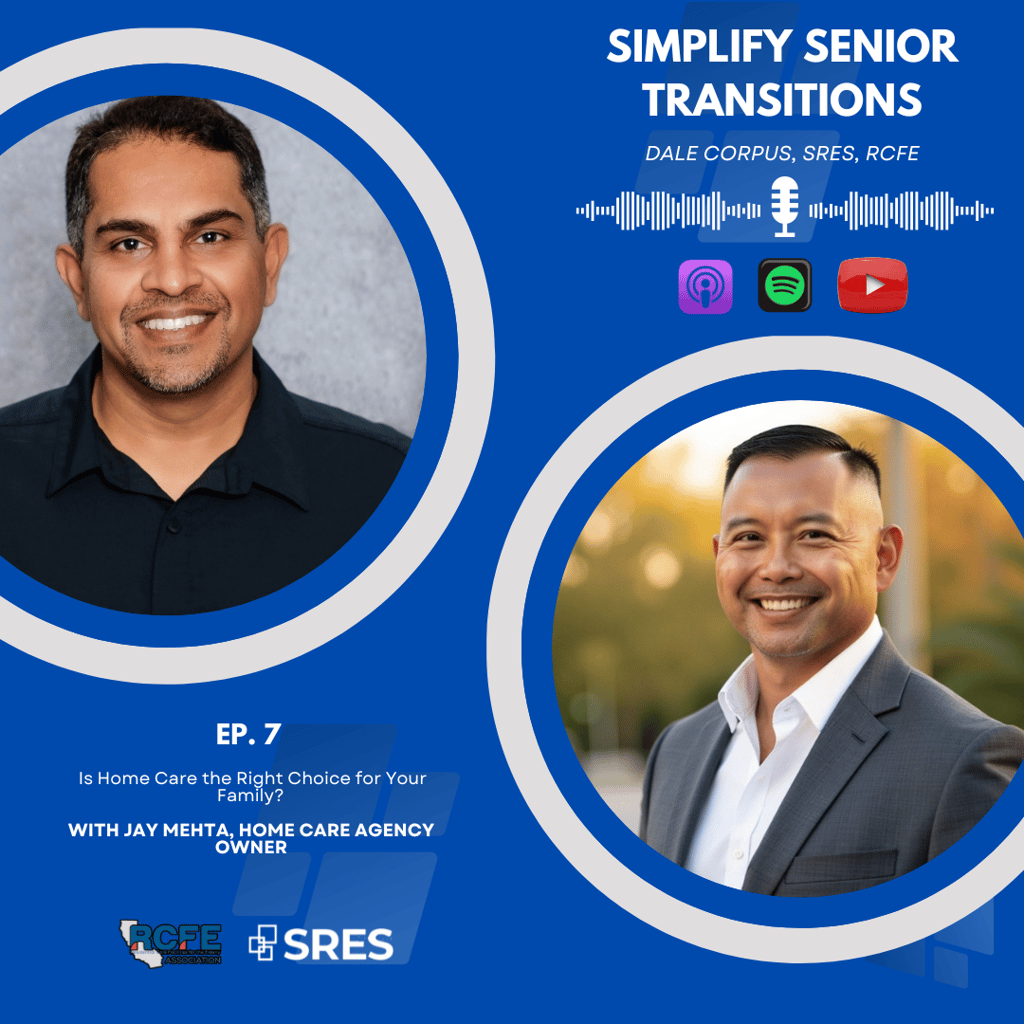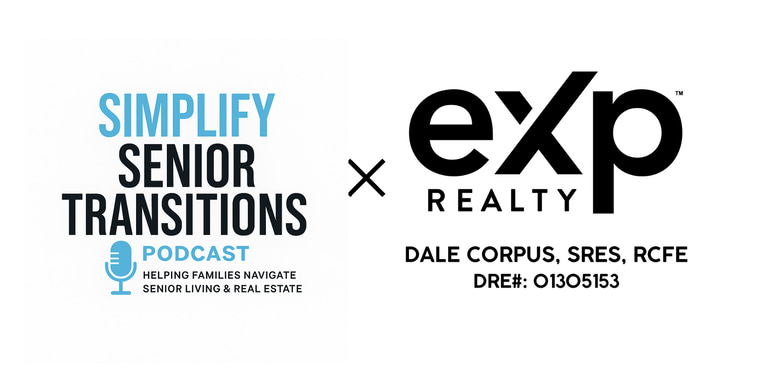Home Care vs. Burnout: How Bay Area Families Are Finding Relief Through Personalized In-Home Support
Jay Mehta of Assisting Hands shares how non-medical home care can ease stress, improve family dynamics, and help seniors thrive at home
Dale Corpus
3/22/20254 min read
Navigating Senior Transitions with Jay Mehta: Is Home Care Right for Your Family?
Navigating the journey of senior transitions for an aging parent can feel like an overwhelming maze, especially for adult children juggling their own careers and families.
From deciding on the right living environment to managing the emotional complexities, it's a path few are fully prepared for.
That's why we're so grateful for insights from experts like Jay Mehta, owner and president of Assisting Hands, a home care agency with a strong presence in the San Francisco Bay Area, including Alameda County, San Mateo, and Danville.
Jay, who transitioned from a tech background into senior care after personally experiencing the benefits of home care for his own father during hospice, brings a unique blend of business acumen and heartfelt empathy to the industry. His agency is dedicated to helping seniors maintain independence and a fulfilling life in their own homes.
In a recent episode of the Simplify Senior Transitions podcast, Jay joined Dale Corpus, Senior Transition Specialist, to shed light on critical aspects of home care that families in our Bay Area communities often overlook. This conversation is a must-listen for anyone facing difficult decisions around senior living.
Here's what you'll learn in this episode:
How to decide if home care is the right choice for your loved one
Common misconceptions about home care and what families often get wrong
The emotional and psychological impact of bringing a caregiver into the home
Challenges within the home care industry and how they are being addressed
Practical advice on how families can work better with caregivers for success
Is Home Care Right for Your Family?
Deciding when and if home care is appropriate is a major hurdle. Jay highlights several signs that suggest home care could be the answer:
Busy adult children: When family members are working full-time or have other obligations, they may not be able to provide the necessary care.
Social isolation: Many seniors are lonely and lack support, making home care a vital connection.
Transitions from medical facilities: After a hospital stay, skilled nursing, or rehab, home care can provide crucial assistance with activities of daily living (ADLs) as your loved one recovers at home.
However, home care isn't always the best fit. If your loved one requires a higher level of medical care or is in an advanced stage of dementia or Alzheimer's, an assisted living facility or memory care community might be more suitable.
Jay emphasizes that Assisting Hands aims to help clients stay as independent as possible in their cherished homes and communities.
Overcoming Common Fears & Misconceptions
It's natural to have hesitations. Jay addresses two primary fears:
Having a stranger in the home: This is a common concern, but after a few shifts, clients often build a comfortable relationship—and even friendship—with their caregivers.
Loss of independence: Contrary to this fear, caregivers actively encourage client participation in ADLs, like folding laundry, cooking, going for walks, or playing card games, fostering independence rather than dependency.
A crucial misconception Jay encounters is the difference between home health and home care.
Home health focuses on medical care provided by skilled professionals like physical therapists, occupational therapists, and nurses.
Home care is non-medical, providing assistance with daily activities such as bathing, grooming, dressing, ambulation, and transfers.
It's also important to understand that home care agencies like Assisting Hands employ highly trained and skilled professionals who meet rigorous hiring standards.
Choosing the Right Home Care Agency
Jay stresses the importance of due diligence when selecting an agency. Beyond basic licensing and credentials, families should investigate:
The company's approach to hiring high-quality caregivers
Their consistency and reliability in service
The level of care provided and the connection between the client/family and the agency's office
Regarding finances, understanding long-term care insurance is vital. Jay advises families to “read your policy” as coverages, daily maximums, and elimination/deductible periods vary significantly even within the same company.
Assisting Hands works with out-of-pocket payments, VA benefits, and various long-term care insurance providers.
Navigating the Emotional & Psychological Impact
The impact of home care extends far beyond physical assistance. Jay has observed overwhelmingly positive emotional outcomes.
After initial reluctance, seniors often form strong bonds with caregivers, leading to increased socialization and companionship—both crucial for longevity.
Jay shared a heartwarming story of an introverted client who, thanks to a carefully matched caregiver, became more social and even started joking and laughing with his caregiver—a positive shift that extended to his family.
For families, home care can significantly improve dynamics. Agencies typically identify a key decision-maker and understand power of attorney situations. They work to collect input from all family members to create a unified care plan, ensuring everyone's desires are met.
A common struggle for adult children is guilt about bringing in outside care. Jay offers an empathetic perspective: it's normal to feel this way, but recognizing your own limits and balancing obligations is key.
Home care allows family members to shift from being primary caregivers for personal needs to enjoying quality time and fun activities with their loved ones—fostering a healthier family dynamic.
Setting Caregivers Up for Success
To ensure a smooth and successful home care experience, families play a crucial role:
Let professionals do their job: Trust the caregiver's training and experience.
Believe in the system: Trust the agency you've chosen and communicate any concerns directly to the office team.
Establish consistent schedules and routines: Seniors thrive on predictability. Regular caregiver visits build trust and respect.
Be flexible and involve the client: While families may have preferences, the client's desires matter too.
Personality matters: A good agency strives for personality matches between clients and caregivers to ensure compatibility.
Final Thoughts
Understanding the nuances of home care and how it integrates with your family's needs is paramount. The senior transition process—often involving significant changes like downsizing and selling a senior’s home—is complex.
Having expert guidance on care options, real estate, and managing the emotional stress is invaluable.
👉 If you or a loved one in the Bay Area (Contra Costa, Alameda, Santa Clara, San Mateo, San Francisco, Solano, and Napa counties) are considering home care or navigating any aspect of a senior transition, schedule a FREE consultation with Dale Corpus at www.simplifyseniortransitions.com.
🎧 You can also listen to the full episode of the Simplify Senior Transitions podcast for more expert insights or reach out to Dale directly via Instagram @soldbydale.
📩 P.S. Got news or an amazing story to share? Email us at dale.corpus@exprealty.com and you might be featured in our next episode!
Watch The Podcast Here



Transitions Made Simple
Helping seniors transition with ease and peace.
📍 Serving the San Francisco Bay Area
📞 GET IN TOUCH
📬 STAY INFORMED
Dale Corpus, SRES, RCFE
📱 925-380-1657
📧 dale@simplifyseniortransitions.com
🕓 Available for free 15 min consultations by appointment
© 2026. All rights reserved.
Sign up for monthly senior transition tips & real estate insights.
